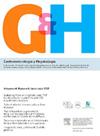Exploring the gut–brain axis in a large cohort of patients with irritable bowel syndrome: Is there a link between depression and intestinal and extra-intestinal symptoms?
IF 1.9
4区 医学
Q3 GASTROENTEROLOGY & HEPATOLOGY
引用次数: 0
Abstract
Objective
We aimed to determine the prevalence of intestinal and extra-intestinal symptoms according to depression severity in a large cohort of patients with irritable bowel syndrome (IBS).
Patients and methods
A consecutive series of patients with diagnosis of IBS according to Rome IV criteria undertaking a social-media based program (B15 program) were analyzed. The B15 program provides evidence-based dietary and non-pharmacological recommendations (i.e., mindfulness techniques and exercise) to improve gastrointestinal health. All patients completed the symptom-severity questionnaire (IBS-SSS) to determine severity of disease and the patient health questionnaire (PHQ9) to assess depressive symptoms. Patients’ depression severity was stratified according to the PHQ9 score: none (0–4), mild (5–9), moderate (10–14), moderately severe (15–19), and severe (20–27). Demographics, IBS phenotype and prevalence of intestinal and extra-intestinal symptoms were compared among groups.
Results
A total of 15,675 patients with IBS were included; 895 (12.1%) with none, 5709 (36.4%) with mild, 4279 (27.3%) with moderate, 2457 (15.7%) with moderately severe, and 1335 (8.5%) with severe depression. Mean IBS-SSS score was significantly higher in patients with depressive symptoms (none 256.5 vs. severe 324.1, p < 0.0001). IBS-M (mixed bowel habits alternating constipation and diarrhea) was more frequent in those with depression (p < 0.0001). The presence of bloating, heartburn, dyspepsia, and belching were significantly more common in patients with higher levels of depression (p < 0.0001). The prevalence and number of extra-intestinal symptoms were also associated with the severity of depression (p < 0.0001).
Conclusions
The presence and severity of depression are strongly associated with the prevalence of intestinal and extra-intestinal symptoms in patients with IBS. Stratifying patients based on both their symptomatic and psychological profile could help targeting therapy.
在肠易激综合征患者的大队列中探索肠-脑轴:抑郁与肠道和肠道外症状之间是否存在联系?
目的:我们旨在确定肠易激综合征(IBS)患者中根据抑郁严重程度的肠道和肠外症状的患病率。患者和方法:对一系列根据Rome IV标准诊断为IBS的连续患者进行基于社交媒体的计划(B15计划)分析。B15计划提供基于证据的饮食和非药物建议(即,正念技术和锻炼),以改善胃肠道健康。所有患者均完成症状严重程度问卷(IBS-SSS)以确定疾病严重程度,并完成患者健康问卷(PHQ9)以评估抑郁症状。根据PHQ9评分对患者抑郁严重程度进行分层:无(0-4)、轻度(5-9)、中度(10-14)、中度(15-19)、重度(20-27)。比较各组人口统计学、肠易激综合征表型以及肠道和肠道外症状的患病率。结果:共纳入15675例IBS患者;无抑郁症895例(12.1%),轻度抑郁症5709例(36.4%),中度抑郁症4279例(27.3%),中度重度抑郁症2457例(15.7%),重度抑郁症1335例(8.5%)。抑郁症状患者的IBS- sss平均评分显著高于无抑郁症状患者(256.5比324.1)。结论:抑郁的存在和严重程度与IBS患者肠道和肠道外症状的患病率密切相关。根据症状和心理特征对患者进行分层有助于靶向治疗。
本文章由计算机程序翻译,如有差异,请以英文原文为准。
求助全文
约1分钟内获得全文
求助全文
来源期刊

Gastroenterologia y hepatologia
GASTROENTEROLOGY & HEPATOLOGY-
CiteScore
1.50
自引率
10.50%
发文量
147
审稿时长
48 days
期刊介绍:
Gastroenterology and Hepatology is the first journal to cover the latest advances in pathology of the gastrointestinal tract, liver, pancreas, and bile ducts, making it an indispensable tool for gastroenterologists, hepatologists, internists and general practitioners.
 求助内容:
求助内容: 应助结果提醒方式:
应助结果提醒方式:


